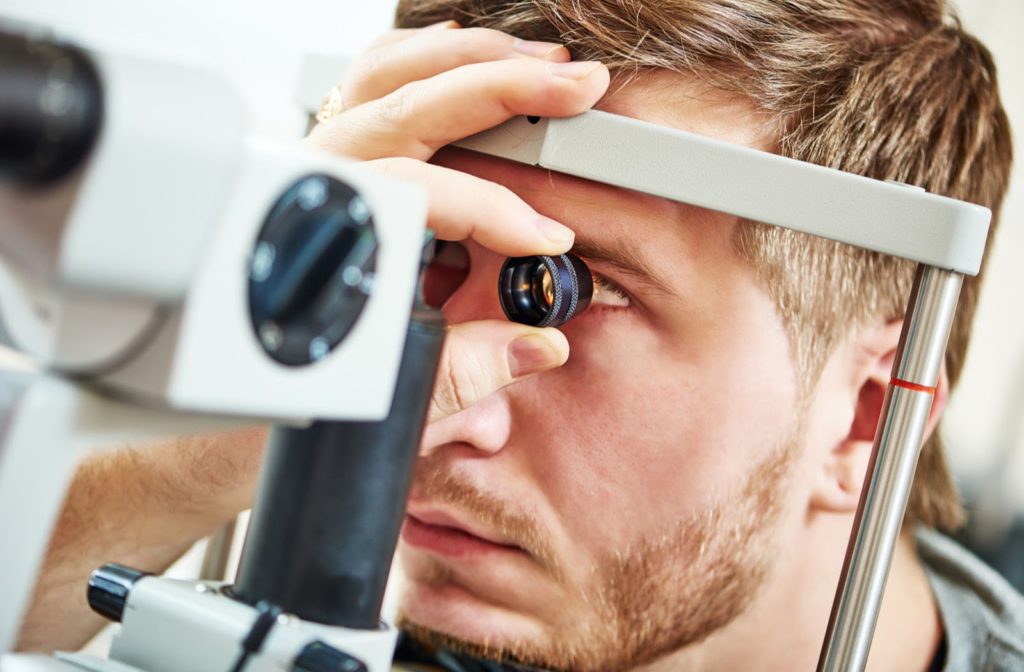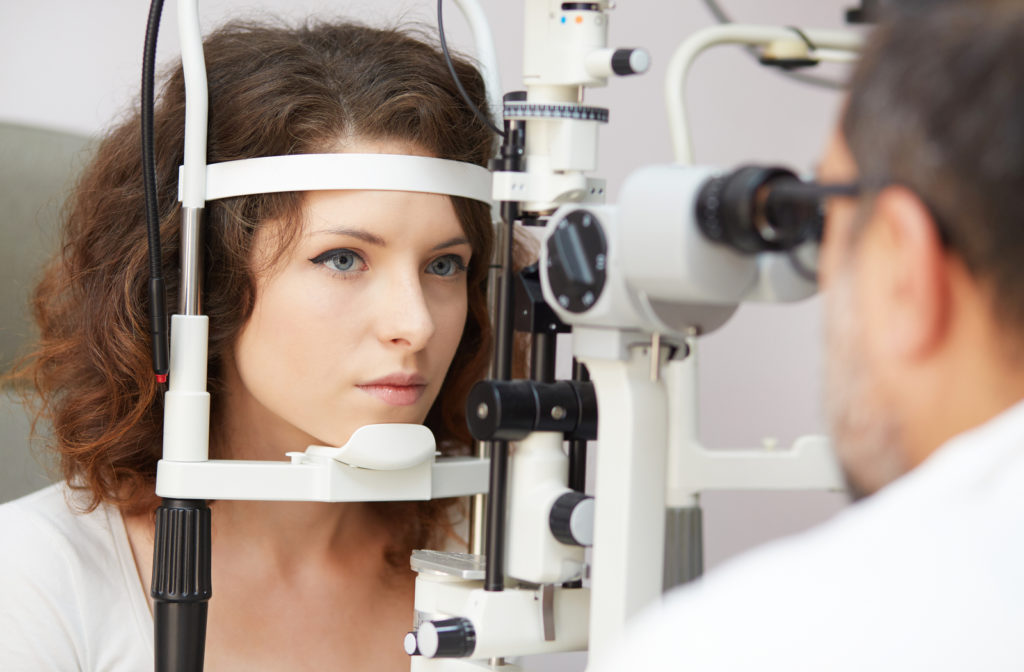Eye exams can be scary if you don’t know what to expect. Luckily, we gathered all the information you could possibly need about eye exams. From how often you need to book one to every test involved in the process, we’ll have you feeling more than prepared for your next eye exam.
What Is an Eye Exam?
An eye exam is simply a checkup for your eyes. Regular eye exams give your eye doctor the chance to examine your entire visual system. They will also check for signs of common eye diseases and update your prescription if you wear contacts or glasses.
When Do You Need an Eye Exam?
There are several reasons why you may need an eye exam. Apart from receiving regular check-ups, you may need to see your eye doctor if you have an eye injury or suffer from any vision symptoms.
Regular Eye Exams
How often you should get your regular eye exam depends on your age, health, and medical history.
The general guideline for how often you should see your eye doctor based on your age is:
- A child’s first eye examination should occur before they are 3 years old
- Starting at age 5 or 6, children should begin to see their eye doctor every 2 years
- For adults who are healthy and have no symptoms of vision problems, the American Academy of Ophthalmology (AAO) recommends having an eye exam annually
If any of the following apply to you, your eye doctor will recommend that you have your eyes checked more often:
- You wear glasses or contact lenses and need your prescription updated
- You have a history of eye disease or vision issues in your family
- You have other health issues that increase your risk of eye disease, such as diabetes
- Take certain medications, like antihistamines or antidepressants that have side effects that affect your eyes

When You Are Experiencing Symptoms
If you experience any of the following symptoms, you may be suffering from vision problems and should book an appointment to receive an eye exam as soon as possible.
- Eye pain in or around the eye
- Changes in your vision, including blurred vision or double vision
- Seeing flashes of light or halos around lights
- Unusual sensitivity to light or glare
- Eye redness
- Changes in the color of the eye
- Itching, burning, or a heavy discharge in the eyes
You may need emergency medical care if you have any severe symptoms or symptoms that don’t go away on their own after a few days.
What Is Involved in an Eye Exam?
Preparing for an Eye Exam
Properly preparing for an eye exam can make your appointment run more smoothly. To prepare, you should consider bringing the following things to your eye exam:
- A list of questions or concerns you may have about eyes or vision in general
- A list of any vision symptoms you may have been experiencing
- Your current prescription contact lenses and eyeglasses
- A list of medications you take
- An idea of recent health issues and family history of eye problems
- Your contact lens case if you have to remove your contacts during your exam
- A friend or family member to drive you home if you cannot drive safely after having your eyes dilated
Knowing your medical history, symptoms, work environment and recreational activities before you begin can help your eye doctor interpret results from your eye exam, giving you clearer results.
What Happens During an Eye Exam?
An eye exam can last from 30 minutes to an hour. During this time, your eye doctor will perform a series of tests to check for vision problems and eye diseases such as glaucoma and cataracts.
Some of the tests you can expect during an eye exam include:
- Visual acuity test: This is the class test you think of when thinking of an eye exam. During this test, you’ll read letters of the alphabet from an eye chart, which tests your vision up close and at a distance
- Fluorescein eye stain test: For this test, your doctor will place a yellow dye, called fluorescein, onto the surface of your eye to check for dryness, abrasions or scratches on your cornea
- Refraction test: You’ll undergo this test if you wear or need glasses or contacts. You’ll look through a binocular-like device, called a phoropter, that helps your eye doctor find your prescription. This test also helps the doctor spot conditions like nearsightedness, farsightedness and astigmatism
- Retina and optic nerve test: Sometimes, your optometrist will use medicated eye drops to dilate your pupils. This is to examine the blood vessels and nerves in the back of your eye for signs of disease
At the end of your eye exam, your doctor will discuss the test results with you. This includes:
- Assessing your vision
- A prescription for corrective lenses if needed
- Your risk of eye disease
- Preventive measures you can take to protect your eyesight
Caring for Your Eyes After an Eye Exam
After your eye exam, your eye doctor will discuss preventative measures you can take to protect your eyesight. This could include treatment plans or general guidelines to ensure your eyes stay healthy.
There are also some additional steps you can take to take care of your vision health beyond your optometrist’s office:
- Eat a healthy, balanced diet
- Maintain a healthy weight
- Avoid smoking
- Know your family medical history
- Know your other risk factors
- Practice good contact hygiene
- Limit screen time
- Get regular exercise
- Wear sunglasses
- Wear protective eyewear



